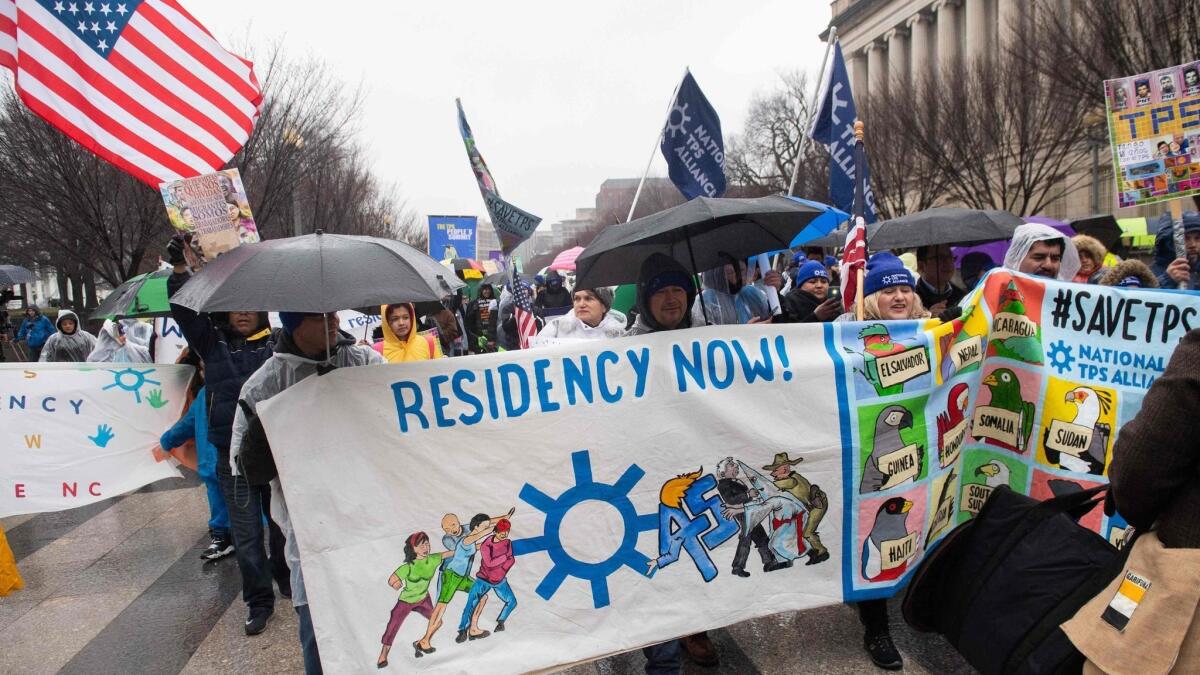Honduran and Nepalese migrants sue Trump administration for ending protected status program

Immigrant rights advocates have filed a class-action lawsuit against the Trump administration over its decision to end humanitarian protections for more than 100,000 people from Honduras and Nepal.
The lawsuit was filed Monday in U.S. District Court in San Francisco on behalf of six immigrants with temporary protected status and two U.S. citizens who are children of TPS beneficiaries. Tuesday morning, hundreds of immigrants and their families, along with Reps. Alexandria Ocasio-Cortez (D-N.Y.) and Ayanna Pressley (D-Mass.), gathered in front of the White House to demand permanent residency for TPS holders.
TPS is a form of humanitarian relief granted to countries devastated by natural disasters or war that allows beneficiaries to work legally while they remain in the U.S. Created in 1990, the program applies to people from 10 countries. But the Trump administration has announced the termination of TPS for 98% of those who have it.
The new lawsuit comes four months after a U.S. district judge in San Francisco temporarily blocked the Trump administration from rescinding TPS for more than 300,000 immigrants from El Salvador, Haiti, Nicaragua and Sudan while their case plays out in court. Those immigrants would have been subject to deportation once their protections expired.
Filed in March, the case of Ramos vs. Nielsen alleges that government officials illegally diverged from how all previous administrations had interpreted TPS law, as part of a broad effort to decrease the number of nonwhite immigrants in the U.S. Lawyers for the plaintiffs cited a comment President Trump made last year questioning why the U.S. should accept people from Haiti and African nations, which he referred to as “shithole countries.”
Hundreds of pages of memos and emails illustrated the Trump administration’s struggle to articulate why the protections were no longer necessary. In the documents, revealed as part of the case, career diplomats and other experts cautioned that the decisions would result in significant humanitarian and political repercussions, while Department of Homeland Security staffers searched for “positive gems” to justify their arguments.
In his October decision to block the terminations from going through, Judge Edward Chen said the plaintiffs had raised serious questions about whether the decision was “influenced by the White House and based on animus against nonwhite, non-European immigrants.”
Government lawyers said they were merely emphasizing different factors in weighing whether to extend protections, and that TPS was never meant to be permanent.
“Temporary protected status is temporary—and it is given on a purely discretionary basis. The secretary’s decision to terminate TPS for Honduras and for Nepal was both lawful and reasonable,” Steven Stafford, a spokesman with the Department of Justice, said Tuesday. “We look forward to defending the Department of Homeland Security’s determination in court.”
The Trump administration canceled TPS for Honduras and Nepal after the first lawsuit was filed. Protections are scheduled to end for some 15,000 Nepalese in June, and for 86,000 Hondurans in January.
Lawyers representing the plaintiffs in Bhattarai vs. Nielsen, the lawsuit filed Monday, make the same legal arguments on behalf of TPS immigrants from Nepal and Honduras as those in the previous lawsuit. They also say that the terminations are unconstitutional because they require the U.S. citizens who are children of those TPS holders — many of whom are school-age — to choose between remaining here or returning with their families to their homelands.
“The humanitarian impact of these decisions, like the decisions at issue in Ramos, is massive,” said Ahilan Arulanantham, an attorney with the American Civil Liberties Union of Southern California, which is one of several groups that filed the lawsuit. “These are people who have lived here in many cases for more than 20 years. They’re deeply embedded in the fabric of the country — these are homeowners and schoolteachers and your neighborhood soccer coach and the manager at the local store. The need for protections is self-evident.”
Honduras was originally designated for TPS in 1999 after Hurricane Mitch caused severe damage to the country.
In a May 11 memo obtained by plaintiffs’ lawyers for the Ramos case, members of the Senate Foreign Relations Committee complained that the Trump administration “deliberately disregarded the counsel and expertise of officials at the State Department and the U.S. Embassies” in Honduras, El Salvador and Haiti, “which uniformly argued for an extension of the TPS designations.” The memo went on to say the termination “was the result of an overtly political process.”
Nepal was first designated for TPS in April 2015 after a 7.8 magnitude earthquake and significant aftershocks struck the country, killing nearly 9,000 people, injuring more than 20,000 and displacing millions.
Lead plaintiff Keshav Raj Bhattarai, 56, lives in Sunnyvale, Calif. His home was significantly damaged in the earthquake, according to the complaint, forcing him and his wife to sleep in a tent outside for a month.
Shortly afterward, Bhattarai and his wife traveled to the U.S. to see their son graduate from a medical fellowship. The following month, Nepal was designated for TPS, and the couple decided to stay in California. Bhattarai now works at a gas station where he was recently promoted to assistant manager. His son is a doctor, trained in geriatrics and nephrology.
“With TPS, I have been able to build a new life here with my family and I have a found a stable job,” he said in a statement. “When I see so many peoples’ lives at risk in losing TPS, I am troubled to see that this country would harm its hard-working workers and people.”
andrea.castillo@latimes.com | Twitter: @andreamcastillo
More to Read
Start your day right
Sign up for Essential California for news, features and recommendations from the L.A. Times and beyond in your inbox six days a week.
You may occasionally receive promotional content from the Los Angeles Times.







